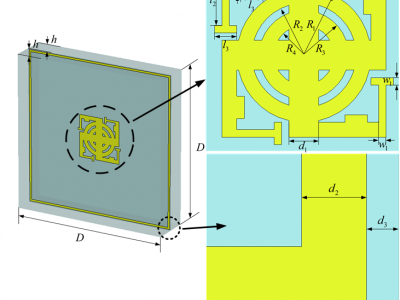Other

The detailed linear trails of CHAM are given.
In each file, you can find a linear trail and the correlation of it.
In a file named "LT_CHAM_64_xR_y.txt", an x-round linear trail with correlation 2^{-y} of CHAM with a block size of 64 bits is given.
In total, there are 44 linear trails of CHAM with a block size of 64 bits.
In a file named "LT_CHAM_128_xR_y.txt", an x-round linear trail with correlation 2^{-y} of CHAM with a block size of 128 bits is given.
In total, there are 54 linear trails of CHAM with a block size of 128 bits.
- Categories:
 26 Views
26 Views
The source code includes the modified version of QuaDRiGa source code, the scritps that we developed to generate the layout and the channel and delay coefficients for the dual mobile space-ground links. We integrate a practical phenomenon in signal reception by employing both a LOS probability model and a state transition model which follows the semi-Markov approach.
- Categories:
 164 Views
164 Views
This study developed a piezo-driven dispenser for microelectronic packaging. The dispenser utilizes a rigid-flexible combined piezo-driven mechanism with a unilateral preloading feature, and the study examined how to estimate droplet volume. Firstly, a static model of the displacement transmission mechanism was established, and the transmission ratio was designed. Secondly, the droplet formation mechanism was studied, and the pressure change process during droplet distribution was simulated and analyzed.
- Categories:
 24 Views
24 ViewsIn this letter, a miniaturized and dual-stopband frequency selective surface(FSS) with a large band ratio(BR) is presented. This structure is composed of one metal layer and two dielectric layers and has excellent miniaturization characteristics. In particular, the unit size is only 0.054λ0 and the thickness is only 0.014λ0, where λ0 is the wavelength corresponding to the first resonant frequency. And there is only one layer of metal layer, which greatly reduces the processing complexity and cost.
- Categories:
 56 Views
56 Views
Predicting the location where a lost person could be found is crucial for
search and rescue operations with limited resources.
To improve the
precision and efficiency of these predictions,
simulated agents can be
created to emulate the behavior of the lost person.
Within this study,
we introduce an innovative agent-based model designed
to replicate diverse psychological profiles of lost persons,
allowing these agents to navigate real-world landscapes while making
decisions autonomously
- Categories:
 46 Views
46 Viewsdata have 16 features with 1 target value
Scope: Primarily focused on diabetes-related information.
Data Size: Contains a substantial volume of records.
Variables: Likely includes patient demographics, medical history, lab results, medications, treatments, and outcomes.
Temporal Range: Time span covered by the dataset may vary.
Privacy Measures: Anonymized to protect patient identities.
Ethical Considerations: Collected and shared adhering to ethical guidelines.
- Categories:
 2250 Views
2250 Views
- Categories:
 69 Views
69 Views
OpenCL has become the favored framework for emerging heterogeneous devices and FPGAs, owing to its versatility and portability.
However, OpenCL-based math libraries still face challenges in fully leveraging device performance.
When deploying high-performance arithmetic applications on these devices, the most important hot function is General Matrix-matrix Multiplication (GEMM).
This study presents a meticulously optimized OpenCL GEMM kernel.
- Categories:
 129 Views
129 Views<p>Mixed critical applications are real-time applications that have a combination of both high and low-critical tasks. Each task set has primary tasks and two backups of high-critical tasks. In the work carried out, different synthetic workloads and case studies are used for extracting the schedule and overhead data on a real-time operating system. The utilization of the task sets lies between 0.7 to 2.4.The Linux kernel is recompiled with Litmus-RT API to monitor the scheduling decisions and also measure the overheads incurred.
- Categories:
 215 Views
215 ViewsThis dataset contains the data for the curves in the paper entitled "Compact All-Metal In-Line Combline Coaxial Cavity Diplexer".
These curve show the group delay at the three ports of the diplexer, the narrowband synthesized and measured responses of the scattering parameters, the wideband measured responses of the scattering parameters.
- Categories:
 131 Views
131 Views

